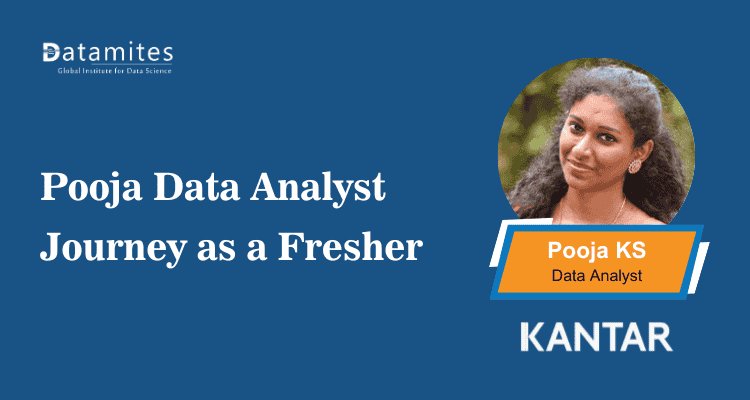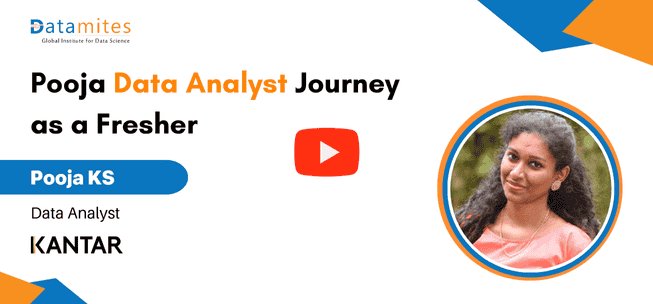Pooja’s data analyst journey as a fresher
Discover Pooja’s inspiring data analyst journey as a fresher. Learn how she built strong analytical skills, gained hands-on experience through training, and launched a successful career in data analytics with determination and practical learning.

Data science offers vast career opportunities, attracting professionals from non-IT backgrounds. Pooja’s transition from an ECE graduate to a Data Analyst at Kantar showcases how dedication, structured learning, and mentorship, combined with practical projects and placement support, can guide aspiring data professionals toward a successful career.
From electronics graduate to data analyst: Pooja’s inspiring career switch
Switching careers can be challenging, particularly in a fast-evolving field like data science. Pooja’s transition from an ECE graduate to a Data Analyst at Kantar provides valuable lessons for aspiring professionals. We explore her experiences, challenges, and strategies that helped her pivot into data science, highlighting the importance of choosing the right IT courses in Mumbai and other major cities in India, practical projects, and guidance from mentors at DataMites.
Q1: Can you introduce yourself and tell us about your background?
Pooja: Hi, my name is Pooja. I graduated in Electronics and Communication Engineering in 2020 and initially worked for six months at NTT Data. I then joined a data science course at DataMites and am now placed as a Data Analyst at Kantar.
Q2: What motivated you to pursue a career in data science?
Pooja: I wasn’t fully satisfied with my initial job and wanted a more interesting and promising field. During the pandemic, I researched emerging fields and discovered that data science was booming with tremendous career growth opportunities. That’s how I decided to pursue it seriously.
Q3: Who guided you during your DataMites training?
Pooja: Ashok Veda was my lead mentor, and the training sessions were excellent. All concepts were explained clearly, live classes were interactive, and all doubts were resolved promptly.
Q4: How did you manage learning data science as a non-programmer?
Pooja: I had very limited programming knowledge from college. Initially, I struggled to grasp Python and machine learning concepts. But after about a month of dedicated learning, I was able to understand the basics and proceed with data science projects.
Q5: What contributions of DataMites helped you the most in your journey?
Pooja: Three major contributions helped me:
- In-depth coverage of all concepts – The syllabus was comprehensive.
- Hands-on projects – Real-world projects across banking, healthcare, and insurance sectors.
- Project mentoring & IPAC certification – Guidance from mentors and structured evaluation helped me refine my skills.
Q6: What kind of projects did you work on during your internship?
Pooja: We worked on multiple projects in banking, healthcare, and insurance. Currently, I am handling a live client project related to IT Service Management (ITSM). The variety of projects gave me exposure to different domains, keeping my options open for future opportunities.
Refer to these articles:
- From Academician to Data Analyst: Pranava’s Inspiring Journey
- Data analyst journey of Paras Kapoor
- From Fresher to Data Analyst: Dinesh’s Career Path
Q7: How did DataMites support you during project mentorship?
Pooja: We had dedicated project mentors who guided us. A platform was provided to post doubts and receive solutions. Our projects were evaluated with detailed feedback on areas of improvement.
Q8: How was your interview experience before landing the Kantar job?
Pooja: I appeared for three interviews facilitated by DataMites’ placement team. The interviews focused mostly on explaining projects, understanding machine learning algorithms like Random Forest, and solving logical puzzles and aptitude questions. Confidence and clarity in project explanation were key.
Q9: What study resources helped you besides DataMites?
Pooja: I referred to recorded classes, online tutorials, and platforms like Kaggle and HackerRank. Learning the same topic from multiple sources gave me a 360-degree understanding and boosted my confidence.
Q10: How did you overcome challenges and stay motivated?
Pooja: I focused on industry-relevant skills instead of trying to learn everything. I treated interview rejections as learning experiences, researched company requirements, and kept improving. Persistence and dedication were crucial.
Q11: Any advice for aspiring data professionals?
Pooja: Nothing is impossible if you give your 100%. Stick to industry-demanded skills, work on projects, and do not get demotivated by initial setbacks. Every step in your journey is an opportunity to inspire others.
Key findings from Pooja’s journey
Pooja’s journey from an electronics graduate to a Data Analyst highlights a DataMites success story, showing how dedication, structured learning, and mentorship, along with practical training, help aspiring professionals excel in data analytics.
- Non-technical background is not a barrier: Transitioning from electronics to data analytics is achievable with structured learning. Pooja’s journey proves that determination and the right guidance can help anyone overcome initial technical gaps.
- Hands-on practice is essential: Project-based learning and Python practice built confidence and technical understanding. Applying concepts to real-world datasets reinforced learning and prepared her for actual industry challenges.
- Structured mentorship matters: Dedicated mentors and project guidance were crucial to mastering concepts. Continuous feedback and doubt-clearing sessions ensured she stayed on track and understood every topic thoroughly.
- Industry-relevant preparation ensures success: Focusing on the skills companies require builds confidence and increases employability. Targeted preparation helped Pooja align her knowledge with market demands and interview expectations.
- Diverse project exposure adds versatility: Working across industries like healthcare, banking, and insurance enhances problem-solving skills. This experience helped her adapt to different business contexts and handle varied datasets efficiently.
- Placement support is invaluable: DataMites’ guidance on mock interviews, resume preparation, and effective cover letter writing accelerated her career transition. Personalized mentoring and timely job updates ensured she secured opportunities perfectly aligned with her career goals.
Pooja’s journey shows that with guidance, hands-on training, and determination, transitioning into a data analytics career is achievable, even from a non-IT background. Through DataMites mentorship, practical projects, and internships, she built confidence and industry-relevant skills. Her story offers valuable insights for aspiring data analysts seeking to overcome challenges, gain expertise, and secure roles in competitive data science careers.
Enrolling in Data Analyst course in Bangalore and other leading tech cities like Pune, Ahmedabad, Coimbatore, Chennai, Delhi, Chandigarh, Jaipur, and Mumbai provides learners with practical industry experience, valuable networking opportunities, and strong career prospects in data analytics and software development.
Refer to these articles:
- How to Become a Data Analyst in Mumbai
- The Future of Data Analytics in Mumbai: Trends and Opportunities
- How much will be the Data Analytics Course Fees in Mumbai?
DataMites Institute is a trusted provider of advanced IT programs, including Data Science, AI, Machine Learning, Python, Data Analytics, Data Engineering, and IoT. Through hands-on projects, internships, and dedicated placement support, students gain industry-ready skills, while globally recognized certifications from IABAC and NASSCOM FutureSkills enhance professional credibility.
Beyond its Data Analyst courses in Mumbai, DataMites offers flexible, industry-relevant training across key cities like Pune, Hyderabad, Ahmedabad, Chandigarh, Delhi, Jaipur, and Coimbatore, ensuring high-quality IT education is accessible to learners throughout India.

